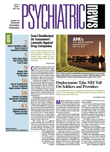APA makes every effort to prevent bias in medical education activities funded by pharmaceutical companies, Linda Bueno, APA associate director for commercially supported activities, told
Psychiatric News (see
How Much Influence Does Drug Industry Have on CME? for more information on this topic). The Scientific Program Committee peer reviews all educational programs proposed for APA meetings and works with APA staff and the Committee on Commercial Support to evaluate and manage potential conflicts of interest, Bueno said. Most members on the committees do not have financial ties with industry; the ones who do must disclose relationships with pharmaceutical companies in detail.
Programs are chosen for APA meetings if they meet scientific standards and the needs of members. The topics, objectives, and content are finalized before any funding is acquired. APA staff members select a small number of all programs planned for a meeting for which they will seek industry funding, and only a portion of these programs actually receive industry funding. The sponsor is not allowed to influence the program's objectives, content, and speakers. The industry-supported symposia (ISS) at APA meetings are clearly distinguished from and scheduled at times that do not overlap with educational programs that do not have industry sponsorship.
The vast majority of educational programs at APA meetings are not supported by the pharmaceutical industry, a major difference from for-profit medical education companies whose business is to pitch educational programs to pharmaceutical companies for funding, according to Deborah Hales, M.D., director of the APA Division of Education.
The same Accreditation Council on Continuing Medical Education (ACCME) standards apply to all CME providers, but the interpretation and implementation of the standards depend on each provider's policies, said Bueno, and APA has very stringent policies to prevent conflict of interest and maintain educational independence in ISS. Before every meeting, APA staff solicit the help of members of the Ethics Committee, Committee on Commercial Support, and Scientific Program Committee to review the proposed program content, such as slides and handouts, for bias and balance. In addition, APA enlists residents to monitor each ISS for bias during the presentations. Before this year's annual meeting, as in the past, resident monitors will be taught to recognize bias and assess the quality of presentations. Meeting participants are required to fill out an evaluation for each industry-supported presentation, in which they are asked about the balance in the presentation and perceived industry bias. If participants or monitors report inappropriate content, APA staff will review the recordings of the presentations. APA has explicit policies on when warnings and sanctions are issued to presenters who do not conform with conflicts of interest guidelines.
APA President Carolyn Robinowitz, M.D., said that the ISS included in every APA meeting are evaluated more closely than any other sessions to ensure that there is appropriate transparency and disclosure, lack of bias, and high quality.
“We take responsibility for the quality of every facet of our meeting. When we receive grants from industry, APA maintains total control of our programs and works to ensure that the programs present objective information, address critical issues, and meet rigorous scientific criteria.” She noted that these sessions are a part of an extensive offering of high-quality sessions and that the faculty for these symposia are generally leaders in psychiatric research and care. “These are not promotional sessions,” she emphasized.
She pointed out that most of the educational programs by for-profit communication companies “do not have the same intense planning and oversight that is part of APA's annual meeting program.” ▪
